Peter MALONE
Saturday, 09 October 2021 13:02
Sid and Aya, Not a Love Story
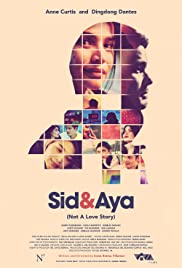
SID AND AYA: NOT A LOVE STORY
Philippines, 2018, 94 minutes, Colour.
Anne Curtis, Dingdong Dantes, Gabby Eigenmann.
Directed by Irene Emma Villamor.
This is a different Filipino film in so far as it is set in the middle of an affluent city, high-rise buildings, stock exchange, hotels… There is no indication of the Filipino countryside or poverty or political or social difficulties.
Dingdong Dantes is Sid, a successful broker, with a girlfriend, living a social life, but seemingly having an early midlife crisis. With his girlfriend travelling internationally, he suffers from insomnia, spending his time in the early hours reading in a hotel lobby. The staff there are curious as to who is and one of them, Aya (Victorian born and educated but a Filipino star), Anne Curtis, finds out who is, joins him in conversation and, over the time, is paid for keeping him company, their talking – not sexual encounter because, as the title said, this is not a love story.
The audience knows that, ultimately, it will be a love story, but Sid has his difficulties, Aya plans to go to Japan to work, reuniting with her mother. While this happens, and Sid has to face his own realities, there is something of a hopeful ending.
1. The title? Repeated throughout the film? But, in fact, a love story?
2. The urban settings, the affluent Philippines, banking and investment, stock exchange, high-rise buildings, hotels? The visit to Japan? The musical score?
3. Sid, middle-aged, his commitment to his work, skilful, investments, the discussion with his uncle, memories of his father and losing, his uncle’s investment, not succeeding? His girlfriend? Their life, social, her international travels? His being alone, insomnia?
4. Sid, in the lobby, reading in the night, the workers and their comments, betting about his identity? Aya, working, the bets with the staff, a device for learning about Sid, spending the time with him, conversation, his wanting company, paying? The effect on Aya?
5. Aya and her many jobs, the dry-cleaning, in costume for the pageant, at the hotel? Sid encountering her?
6. The conversations, Aya and her taking initiatives, Sid and his response, the effect on his work, the social and his punching his collaborator?
7. Aya, her father and his illness, her mother in Japan, her intention to go to Japan? SID and the jewellers, her trying on the ring, stealing from Sid to get to Japan?
8. SID, his girlfriend’s return, dissatisfaction?
9. Aya in Japan, at the club, her mother, her mother and her lover? Sid and his arrival, tracking her down, the meeting, her confession about the money?
10. SID, in love with, proposing the rendezvous, his waiting, her not turning up?
11. Back home, Aya the table, Sid passing by, going in, meeting, and a future?
Published in Movie Reviews
Published in
Movie Reviews
Saturday, 09 October 2021 13:02
Ni Un, Ni Deux/ One Role for Two
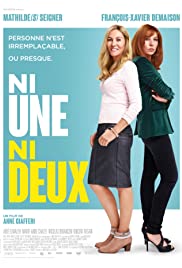
NI UN, NI DEUX/ ONE ROLE FOR TWO
France, 2019, 98 minutes, Colour.
Mathilde Seigner, François-Xavier? Demaison, Arie Elmaleh, Marie- Anne Chazel.
Directed by Anne Giaferri.
This is a twins story, identical twins, but one of the twins not knowing who she really is, the other knowing. But, the twins are about to turn 45, 40 years of separation.
One of the best aspects of the film is the performance, or, rather, the performances by Mathilde Seigner as each of the twins. Initially we see the unpleasant, self-absorbed, celebrated actress, Julie. Then, Julie is approached by a lookalike, Laurette, a genial hairdresser from the provinces. While there are similarities, and, with the actress, identical lookalike, Mathilde Seigner is able to create quite different characters.
Julie is depressed about her profession, losing popularity and critical response, deciding to have her lips enhanced but the surgery preventing her from starting a new venture, a comedy, for which she is not talented. The brainwave, of course, is that Laurette take her place – and Laurette is the exact opposite, friendly towards everyone, successful in portraying comedy, and even falling in love with her script-writer chauffeur.
Julie has been adopted by her aunt whom she sees as her mother – and the intention has always been to tell Julie the truth but there has never been an opportunity. Ultimately, Julie comes to realise what has happened. Truth is told on a television interview with the two together and, in a pleasant twist, Julie finds her vocation as a hairdresser in the provinces and, of course, Laurette becomes the star.
1. A story of twins? Identical? But a story of middle age?
2. The Paris settings, apartments, the streets, cafes, film sets? The contrast with Aix-en Provence, the countryside, the streets, the hairdresser’s shop? The musical score?
3. Julie’s story? Turning 45, celebrated film star, her career, press conferences (and the diva about the tea)? Her agent of 20 years, relying on his opinions, few turning up for the screening of her arthouse film? Being depressed? Her relationship with her mother, her mother treating her as a little girl? Her concern about her appearance, the plastic surgery, her lips? Her reputation for being difficult? The suggestion she do a comedy?
4. With her agent, Laurette coming to see her, talk, the photo? Laurette, hairdresser, a daughter, knowing the truth, wanting to communicate the truth? Julie and her difficulty, the swollen lips, thinking of Laurette as her stand-in, her visit to Paris, the conversation, Julie’s decision to go ahead, Laurette agreeing?
5. Laurette, at the studio, being Julie, discovering the realities of filming, pleasant to everyone, her driver, script writer, the attraction, falling in love? The make-up girls liking her? The director, her scenes, her rehearsals with Julie and Julie’s criticisms? Her being herself, the success? Doing half the film?
6. Julie wanting to take over, haughty with people, the reaction of the make-up girls, the director and difficulties? The completion of the film? Her not wanting to celebrate?
7. The agent, his discovering the truth, keeping it quiet? His reacting Julie, never asking about his children? 20 years?
8. Laurette at home, the encounter with Julie’s mother? The truth? The parents killed in an accident? The twins, the decision as to who was more needy, Julie, Laurette adopted out? The mother and a decision when to tell Julie? The photo album?
9. The two, their appearances, manner, allergies, the toy rabbits…?
10. Julie and the driver, his misinterpreting, spending the night with her? Laurette arriving?
11. The make-up girl, looking in Julie’s phone, knowing the truth, the magazine article and photo? The two women, discussions, going to the television interview, Julie telling the truth?
12. Julie going to the provinces, hairdressing, the owner of the restaurant? Dating?
13. Laurette, her daughter going to Paris, her skill at acting, the agent, the driver, at the studio?
14. A pleasant riff on the twin’s story?
Published in Movie Reviews
Published in
Movie Reviews
Saturday, 09 October 2021 13:02
Miss Juneteenth
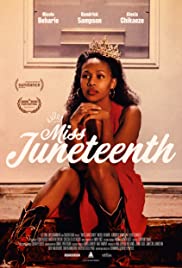
MISS JUNETEENTH
US, 2020, 99 minutes, Colour.
Nicole Beharie, Alexis Chikaeze, Kendrick Sampson, Lori Hayes, Marcus M Mauldin, Liz Mikel.
Directed by Channing Godfrey Peoples.
A prospective audience looking at the title for this film might think it is a misprint. But it is not.
Fortunately, the explanation comes early in the film – and quite an interesting explanation, important for African-Americans? and their history, the ending of slavery, slaves in Texas, their getting the application of the abolition of slavery two years late, June 19th 1865. And, in Texas, a commemorative celebration, especially with a pageant, a beauty pageant for the teenage girls at school, their aspiring to be Queen of the pageant, wearing the crown, Miss Juneteenth.
This is very much an African-American? story (only a few small roles for white actors). It will certainly appeal to its target audience and, one hopes, will be seen by the wider American audience. For audiences beyond the United States, it is something of a curiosity item, a reminder of American slavery and abolition, and the situation of the African-American? communities in contemporary Texas towns.
It is also a film about mother-daughter relationships and, this is one of its great strengths. Turquoise (Nicole Beharie a strong screen presence) was Miss Juneteenth 15 years earlier (but she still has the crown and the pageant dress in her wardrobe). She has a number of jobs, an assistant manager at a diner, cleaning the toilets, serving customers… And she has skills in cosmetic preparation of the deceased at the local funeral home. Her life is not quite what she imagined.
However, her whole attention is given to her daughter, Kai (Alexis Chikaeze Wrenn, about to turn 15. As we might expect, Turquoise gives all her attention to Kai, preparations for the pageant, saving for a dress, paying the deposit, the text of the poem that she recited and hopes her daughter will recite. There is a husband in the background, Ronnie, whom she loves, but is unreliable, comes and goes, not a great financial support, getting himself in trouble with the law.
Kai is a genial young girl who loves her mother but, as with girls that age, clashes with her mother’s expectations and discipline. However, she prepares very seriously for the competition.
The narrative consists mainly of episodes, Turquoise and Ronnie and their love and their clashes, the attentions of the manager of the funeral parlour, Turquoise looking disapprovingly at Kai’s friends and Kai and her rap and dancing, and relying on her phone, the manager of the diner having a heart attack, visits to the hospital, a social to raise money for his hospital expenses…
And, there are scenes of the Juneteenth celebration, processions and floats in the street, the rehearsals for the competition (and Turquoise unable to pay for Kai’s dress) and the performance of the contestants, Kai wrapping and dancing rather than reading the poem – and her mother’s acceptance.
And, fortunately, an ending, not quite what we were anticipating, but happily upbeat.
1. The title? The explanation? Texas? The freedom of the slaves? Two years late? June 19 1865? The commemoration, the pageant?
2. The town, homes, the diner, garages, church, school, auditions, the parade, the pageant and rehearsals, performance? The atmosphere? The range of songs?
3. An African- American story? For the African American audience? The broad American audience? International audiences?
4. The focus on Turquoise, her memories of being crowned Miss Juneteenth, her dress and crown, keeping the crown, the dress in the cupboard? Her age, at the diner, cleaning the toilets, working with the customers, with Wayman, with the staff? The audience discovering that she had a daughter, Kai, turning 15, her ambitions for Kai for the pageant? Training her, picking up the dress, getting the money, the deposit? The parliament and the recitation? Her relationship with Ronnie, the marriage, his being present and absent, going to the garage for the repairs, his visiting the house, parking up the street, her relationship with him? Her working with the funeral home, make up, the manager and his hopes, his later taking her to the function for Wayman, the horse, Ronnie and his anger?
5. Kai, her age, at school, relationship with her mother, accepting the presence and absence of her father, the modern girl, hair and clothes, phone, her mother being strict? Her reactions, but the reconciliation? The preparation for the pageant? Her hopes? The dress, the poem? Mother disapproving of her friendship with the boy – and his later reappearance at the pageant, playing the music for her performance? Her having to go to the rehearsal in her shorts? The resolution, her mother’s dress?
6. The visit to the church, the leader of song in the church, the discussions about the pageant? About the scholarship? The visit to turquoise’s mother, no bonding?
7. Ronnie going fishing, the alligator, prison, the fine, unreliable with the money?
8. Wayman, his heart attack, everybody at the hospital, the celebration to raise money for him? His coming out of hospital, Turquoise and her situation, his giving her the deeds to the diner?
9. The rehearsal, Turquoise embarrassed, Kai in shorts? The pageant in the streets, the floats? The night of the competition, the girls and their dresses, each girl and her particular performance, Kai not reading the poem, doing the dancing and the rap, on what it is to be a woman? Her mother’s reaction, accepting it, the applause? Kai not getting a place? Mother and daughter reconciled?
10. A film about mothers and daughters? A film about American pageants and the effect of the competition? A film about memories of the African- American past, slavery and freedom?
Published in Movie Reviews
Published in
Movie Reviews
Saturday, 09 October 2021 13:02
Lure of the Islands
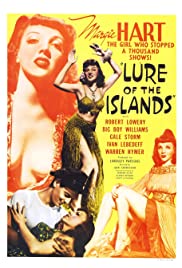
LURE OF THE ISLANDS
US, 1942, 61 minutes, Black-and-white.
Margie Hart, Robert Lowry, Guinn 'Big Boy ' Williams, Gail Storm, Ivan Lebedeff, Warren Hymer.
Directed by Jeannie Yarborough.
The first thing to say is that this is pretty terrible.
It is an inexpensive supporting featurshe, something of a morale booster during World War II. The setting is Tahiti. Two Americans are landed because a contact has been killed by the German authorities on the island. One presumes they are there because Tahiti is still a French colony, therefore under German rule, Vichy.
The two men are brash American GIs with no apparent talent for being agents. They are the wolf-whistling type with their ostentatious, presumptuous flirting comments. They land on the island wearing hat/cap, T-shirts trousers and shoes and this is what they wear throughout the whole film.
This is Hollywood’s idea of South Sea paradise, South Sea songs, swaying dancing, a band, but it all looks like an act in a New York restaurant, a touch of cabaret. There is some action and Hollywood’s idea of the “natives�. The agents discover a radio, steal the condenser, but later re-insert it to misguide the Japanese plane which crashed lands. There is also the problem of clearing all the trees by the water overnight for a landing and the Chief going to prison for refusing.
The main femme fatale on the island has an American father and an island mother and her name is Tana Shaughnessy – and she does some of the singing although Gail Storm has a very Brooklyni song as well.
Some shootings, some heroism, Tana wanting a marriage, Gail’s Storm flirting with Williams.
It is unbelievable account of two Americans winning the war!
Published in Movie Reviews
Published in
Movie Reviews
Saturday, 09 October 2021 13:02
Hitler: Beast of Berlin
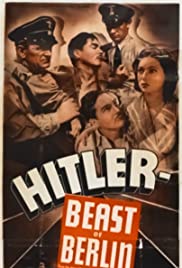
HITLER: BEAST OF BERLIN
US, 1939, 72 minutes, Black-and-white.
Roland Drew, Alan Ladd, Stephanie Duna, Greta Granstedt, Frederick Giermann,
Directed by Sherman Scott (Sam Newfield).
This propaganda film was in production before the outbreak of World War II, released in October 1939. It focuses on members of the underground in Germany, their meetings and plans, their production and distribution of pamphlets, arrests, torture, sentenced to concentration camps.
The central character is Hans, an intelligent member of the group, a leader, married with a child on the way. He is played by Roland Drew. His friend, Karl, is well-educated, apprehensive. He is played by Alan Ladd. One of the members of the group is an SS guard, apprehensive, forced to participate in torture, unable to hold his drink when forced to socialise, revealing the names of the group.
Of interest, there is a parish priest, Father Popper, played by Frederick Newman. He is a member of the group, interesting in the picture of Catholic underground activity. He is also arrested, ridiculed by a guard in the concentration camp, dropping his rosary beads and the guard stamping on them as he walked away. And his making the sign of the cross, there is indication that other members of the group are Catholics.
Hans is a strong personality, has fought in World War I, along with the now commander of the concentration camp. His wife is pregnant. The film has a happy ending, although Alan Ladd’s character is killed, and Hans is reunited with his wife in Switzerland.
1. A brief American propaganda film? Filmed in 1939? Released after the outbreak of war?
2. The German settings, the town, the meetings, the beer hall, the streets? Interrogation, torture, cells? The concentration camp? The musical score?
3. The presentation of the German underground in the 1930s, their ideology against Hitler, accused of being communists, their being presented as Catholics, printing press and distribution of pamphlets, meetings, friendships, arrest, interrogation and torture, concentration camps?
4. Hans as the central figure, the leader, married to Elsa, her expecting the baby? The printing, the meeting in the beer house, the help of the proprietor, his friend, the guard, blurting out his name, the arrest, interrogation, torture, whipping, sent to the concentration camp, the interrogation by his former ally, his release refused? The money given to his wife by the lawyer, the bribe to the authorities, his escaping, passport, reunited with his wife and child?
5. Karl, young, intellectual, enthusiastic, learning the printing, distributing the pamphlets, on the chimney and the smoke blowing them around the town? Apprehensive? Arrest, to the concentration camp, nerves, the attempt to escape, his being shot?
6. The Catholic priest, with the group, friendship? Participation? Arrest? In the concentration camp? The rosary beads, the mockery of the guard, his treading on the beads?
7. The other members of the group, the meetings at the beer house, the barman and his help, arrested, tortured? The work together?
8. Karl, his girlfriend? Hans’ wife, pregnant, fears, the money for the bribe, the authority, visiting hounds in prison? Persuaded to escape, reunited at the end?
Published in Movie Reviews
Published in
Movie Reviews
Saturday, 09 October 2021 13:02
Enola Holmes
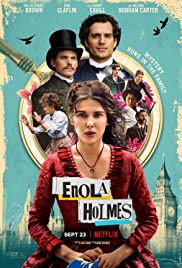
ENOLA HOLMES
UK, 2020, 124 minutes, Colour.
Millie Bobby Brown, Henry Cavill Sam Claflin, Helena Bonham Carter, Louis Partridge, Burn Gorman, Adeel Akhtar, Susan Wokoma, Hattie Morahan, David Bamber, Frances de la tour, Claire Rushbrook, Fiona Shaw.
Directed by Harry Bradbeer.
Quite a delight! One might almost say, a treat. At least for those who enjoy being immersed in the Holmes family, admirers of Sherlock, critical of Mycroft, and relishing the imagination of those novels and films and television series over the decades that have brought them all alive, exploring the Young Sherlock Holmes as well as seeing Ian McKellen? in Sherlock’s later years. And now, the discovery of Enola, the teenage sister who has stayed at home with their mother, and, we discover, quite a mother! Well, perhaps the Conan Doyle purists may not be so tolerant of all these imaginings – but most of us are.
Millie Bobby Brown makes quite an impression as the 16-year-old Enola – and, Enola is an anagram for Alone, Enola and her mother being experts at anagrams and codes and intricate scrabble variations. Those encountering Millie Bobby Brown for the first time might think that she has quite a future ahead of her – only to find that she has an extensive past in both film and television, especially Stranger Things. She is a vital and dynamic screen presence and the screenplay provides her with wonderful opportunities to look straight to camera, to make comments, to raise eyebrows, to engage us in all her moods, her aspirations, all her plans and activities. I would have liked even more!
And Helena Bonham Carter plays her mother, obviously a suffragette before her time, the widow who takes active pleasure in training her daughter in all kinds of fields, reading and history, science and engineering, delighting in codes and words, training Enola to defend Herself, to take initiatives, all seen in enjoyable intercut flashbacks.
And, well we might ask, where is Sherlock? And, to a lesser interest and extent, where is Mycroft? They have long since left home, Mycroft in business, politically conservative (to say the least), enjoying his club, but, with the disappearance of their mother, Enola becoming his ward. Sherlock has already made his mark in the world of detection. Sam Claflin plays Mycroft, communicating his insufferability. Sherlock is played by Henry Cavill. (This reviewer always has problems with Henry Cavill, usually giving rather stolid performances, even as Superman, more suited to Clark Kent – although he has the looks of the genial Christopher Reeve.)
Yes, there is an adventure, there is detection, Sherlock involved, of course, but Enola discovering and developing her talent. It concerns a young lord, the Marquis of Tewkesbury (Louis Partridge), a soft -looking youth – with Enola remarking that he is looking like the nincompoop he was born to be! (Yes, she does have a way with words.) The mystery involves the death of his father, a seemingly menacing uncle, his detached mother, his strong dowager grandmother, and a sadistic assassin with a bowler hat. And, it is the time for votes in the House of Lords, for women’s rights, for women’s demonstrations (including stashes of gunpowder).
And, there are some wonderful cameos. Helena Bonham Carter, always distinctive, Fiona Shaw as the bombastic headmistress of the school for ladies and proper manners (but with some heart flutters for Mycroft), Frances de la Tour as the dowager, Burn Gorman as the assassin. Throughout the film, there is ethnic groups are represented in London, Inspector Lestrade (Adeel Akhtar with Pakistani father, Kenyan mother; cafe owner and martial arts instructor, Edith (Nigerian parents) and many incidental characters played by West Indians and Asian actors.)
The film is based on a Young Adult novel by Nancy Springer – though, interestingly, the screenplay is written by Jack Thorne in the film directed by Harry Bradbeer.
Advice is – surrender to the Holmes family, their adventures, and the atmosphere of 19th-century London and country estates.
1. An enjoyable visit to the Holmes family? The status of Sherlock, Conan Doyle, film and television versions? Young Sherlock Holmes, older Mr Holmes? Presentations of Mycroft?
2. Audience knowledge of Holmes, as a detective? The revelation that he had a younger sister? Enola – the anagram of Alone?
3. A detective story, audience interest, the introduction to Sherlock, to Mycroft? To Enola, her age, a Young Adult story, audiences identifying with her? Living in the 19th century? The young woman of the 21st-century? Her identity, her family, her mother and education, her mother disappearing? Her brothers, in charge, Mycroft and his ideas of her education, the school, the headmistress, the formality, the uniform, women’s roles, modest laughs…? But the young man in the story, Enola to the rescue, adventures? Her wit and wisdom, taking risks?
4. Millie Bobby Brown, her screen presence, strong, her emotions, her plans? The device of her communicating with the audience, straight to camera, checking, eyebrows raised, confiding, asking advice?
5. The editing, pace, the intercutting of the action with the flashbacks to her growing up? Seeing her as a child, with her mother, her growth, her activities, reading and history, science and engineering, martial arts, self-defence? Enola influenced by her mother?
6. The costumes and decor, the house, the boarding school, the mansions, London, the streets, House of Lords, the world of toffs, Mycroft and his club? Yet the martial arts, the cafe, stock of dynamite?
7. The delight in words, codes and anagrams, verbal dexterity, sights and sounds?
8. The repartee, Enola and her wit, the audience enjoying the comments and the irony?
9. Enola, her brothers and their leaving home, the death of her father, her mother, the mother’s disappearance, no explanations, the range of clues, flowers, words, codes? Enola working out the meanings?
10. Her quest, disguised as a boy, the railway trip, the man with the bowler hat, the intrusion of the boy, their arguments, her leaving, returning, helping him, at the door of the train, the fight, leaping off, sharing, explanations, cutting his hair, on the dray, arriving in London?
11. Enola, following the clothes, buying new clothes, the shop woman and getting the lodgings (and betraying her and getting the reward)? Working out the clues and following the flowers? Going to Limehouse, the explosives, the man with the bowler hat? Her fight with him? Extensive, techniques?
12. The visit to Edith, the teashop, the martial arts classes, knowing about her mother, the memories of the meeting in the closed-door? The later visit of Sherlock?
13. The changing attitude towards the young man, disguising himself as a widow, going to the family home, as Sherlock Holmes’s assistant? The presence of Inspector Lestrade, the argument as to who knew more about Sherlock Holmes? Her being ousted, walking on the grounds with the dowager and the discussions about the boy? Discovering the treehouse? Clues from the flowers? His dead father, the mother seeming to detach, the uncle seeming sinister? In fact, a different interpretation for the truth?
14. The flower clues, Covent Garden, hiding the boy, the return to the house, the vast corridor and the statues, the man with the bowler hat, the fight, the shots, the dowager with the gun, the boy with the armour? The dowager and her motivations, preserving England?
15. Mycroft, searching for Enola, giving up? The headmistress, Enola going to the school, the classes, the meals, the uniforms? The boy coming with the box, her escape, taking the headmistress’s car? And the sketch indicating the headmistress’s heart fluttering for Mycroft?
16. Sherlock sending the message, seeing the doll, the memories of the doll, leaving it? Mycroft giving up? Sherlock willing to be responsible for her?
17. Her mother, the explanations, the political background, suffragettes and feminism at the end of the 19th century? The House of Lords and votes?
18. Enola, on her bike, choosing her own path, telling the audience that she would be a detective?
Published in Movie Reviews
Published in
Movie Reviews
Saturday, 09 October 2021 13:02
Romance on the Menu
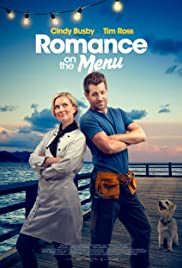
ROMANCE ON THE MENU
Australia, 2020, 95 minutes, Colour.
Cindy Busby, Tim Ross, Naomi Sequeira, Peter Bensley, Marita Wilcox, Barbara Bingham, Perry Mooney, Joey Vieira.
Directed by Rosie Lourde.
What is wrong with a predictable romance? Aren’t romantic comedies meant to be predictable, the entertainment in seeing the two characters, meeting, the encounters, falling in love, clashes, the happy ending?
And this is what happens here – except that this is an Australian film, made in Queensland, with an Australian cast including some Americans living in Australia except for the leading lady, Canadian Cindy Busby.
So, this is a sit back, relax, an undemanding experience, following the step-by-steps of the predictable romance.
Hypercritics beware!
1. Popular romantic comedy? New York opening? The change to Australia? Laid-back Queensland? Americans and Australians?
2. The New York settings, the restaurant, the kitchen, the customers? (And detailed chef scenes at the opening and the end.)
3. Caroline arriving in Australia, the welcome, the past visits, bond with her aunt, and with her mother, inheriting the restaurant, her perfectionism and control in New York, beginning to let go? The encounter with Cook, renting the house? Going to the restaurant, ordering everything, notes and testing? With Dale, meeting the staff, the revelation and discoveries?
4. The situation, having to sell the restaurant, memories of the aunt, the photos and recipes, the loyalty of the staff, the need for repairs, Cook and his offering to do the repairs?
5. Caroline’s character, in a different context, supervising the repairs, expectations for the visit, meanwhile the critics’ visit in New York? The starting to cook and comparisons, criticising Cook’s pies, their working together? Marita fostering the relationship? Caroline’s mother on the phone? The breakup from Nathanial, his not sharing her vision, his visit, and the irony of his coming to Australia in his jet, Caroline’s success? Her telling him to go?
6. The interactions during the day, Cook taking Caroline fishing, the fresh special of the day, the trip to the beach, his boat? Falling in love?
7. Beth, from the farm, liking the restaurant, preparing the deserts, her book club, cooking with Caroline? The celebration of the aunt, Beth and her organisation, Caroline proving she could cook better pies? Cook and his cheesecake with lemon myrtle? On the pier, the gathering, the meal, the dancing, enjoyment?
8. Caroline and decisions, the repairs, the supervision, the sale? Changing her mind? Nathanial’s visit, the clash with Cook? Locked in the pantry, the fight? The change of heart?
9. The decision, the inspection and passing, Cook as chef, Marita as manager, promoting Beth?
10. The return to the US, work in the kitchen, the past tension with Molly, encouraging her, the critics and their enjoying the meal? Booking for the birthday?
11. Cook turning up in New York – and the prospect for the future?
12. Entertainingly predictable?
Published in Movie Reviews
Published in
Movie Reviews
Saturday, 09 October 2021 13:02
Lady from Chunking
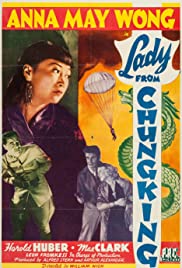
LADY FROM CHUNKING
US, 1942, 66 minutes, Black-and-white.
Anna May Wong, Harold Huber, Mae Clark, Rick Vallin, Paul Bryar, Ted Hecht, Ludwig Donath.
Directed by William Nigh.
This is a small war propaganda film from 1942, acknowledging World War II in Europe and German domination, but also the presence of the Japanese for years in China and then the bombing of Pearl Harbor.
It is a star vehicle for Los Angeles born, Chinese actress, Anna May Wong, she is a strong presence, resistance leader sent to work with coolies in the rice fields. However, there is anticipation of the arrival of the Japanese general (Harold Huber quite effective but not looking Japanese), her being seductive but getting the information about the arrival of Japanese troops. Two American agents are parachuted in, one injured and saved, the other imprisoned and the general confronting him.
The local hotel is managed by a Westerner, over-eager to be loyal to Hitler and to the Japanese ambitions. Mae Clark also appears as a singer, well-travelled, an American father and a Russian mother. The general is initially intrigued by her but then is captivated by Anna May Wong. The singer is persuaded to help the imprisoned American to escape.
There is a very sombre sequence where the coolies are arrested because of the killing of the overseer and the concealing of his body – Anna May Wong persuading the general to free the coolies because they are of more value producing food than dying. However, the old men are executed.
The general takes a long time to die at the end and has speeches about Japanese ambitions. But the final speeches, even though she is executed, are very patriotic coming from Anna May Wong.
Direction is by William Nigh who made many short features in the 1930s, especially some thrillers, and some Mr Moto films.
1. World War II propaganda film? Small budget? Supporting feature
2. The American audience of 1942? The war in Europe and the German presence, even in China? Pearl Harbor? American involvement? Chinese resistance?
3. The town, the rice fields and the coolies, the hotel, the preparation for the general’s visit, the interiors? The town meetings? Contrasting with the luxury for the general? The musical score?
4. Quan may, her background, leadership of the coolies, the resistance, her presence in the fields, the encounter with live IRR, reparation for her to meet the general, dining with him, his romantic advances, her keeping her dignity? Drugging him? Going to the meeting? The rounding up of the coolies, preparation for execution, her persuading the general that they were more useful producing food in the fields, yet the execution of the elderly men? The reaction of the angry young man, thinking her a spy? Are coming to the meeting? The plan, the rescue of the American soldier, Lara and the escape of the other soldier, the plan to blow up the bridge and prevent the troops coming?
5. The Japanese presence, 1942 and the interpretation, American actors portraying the Japanese? The overseer in the field and his being killed, the body hidden? The general and his assistant? The general, his arrogance? Reputation as a butcher? His dialogue with the American and the American to finance? Getting the American to watch the executions? Food preparation, champagne? With Kwan Mei, the attraction, his wanting intellectual and dignified company? Laboratory tests on, his discarding her? The body of the overseer, planning the executions, his being persuaded against them? His being drugged? The buildup to the final confrontation, the generals respect for her, her shooting him, his long speech about himself and the war? Is watching her being executed – and her final speech?
6. The Americans, the flight, parachuting, the plan, the capture, the Chinese with the other pilot, escape, the plan for the sabotage of the train?
7. On my and her assistant, his keeping control, the angry young man? The shootouts?
8. On my, her final speech, the appeal to the American public?
Published in Movie Reviews
Published in
Movie Reviews
Saturday, 09 October 2021 13:02
Straw Man, The
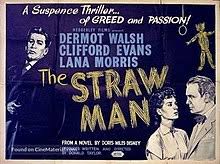
THE STRAW MAN
UK, 1953, 67 minutes, Black-and-white.
Dermot Walsh, Clifford Evans, Lana Morris, Amy Dalby, Philip Saville.
Directed by Donald Taylor.
A brief drama, a murder mystery, and insurance investigation, a police investigation. A young woman is found murdered on the beach. The main suspect is an American businessman and the death happened in his house. His alibi is that he had drunk too much and had collapsed, unaware of what had happened.
He had made an insurance plan on his life and the company sends one of their best investigators, Clifford Evans, to find out the truth. He teams up with a local private detective, played by Dermot Walsh. There is a focus also on the condemned man’s wife, played by Lana Morris. There is also a distraction by a rather dotty old lady thinking that she was being followed – but this becoming significant in terms of the murderer and she herself being killed.
Halfway through, the solution is revealed and the drama is following the plans and tactics of the murderer and the condemned man’s wife, the contriving of a setup, the insurance man and his perseverance, following leads, following clues – and melodramatic ending.
1. B-budget British supporting feature of the 1950s? Murder mystery? Insurance scam? Investigations?
2. The Brighton setting, the city, the beachfront, homes, restaurants? The musical score?
3. The title, the mystery as to who was the murder? If not the accused, who?
4. The setup, the murdered woman, found on the beach, evidence she was killed in the accused’s house? His drinking, collapse, alibi? His marriage, arrested in France? His lawyer, the interrogations, Howard and his questions? The trial off-screen? His condemnation?
5. The old lady, thinking she was being followed, on the bus? Her confiding in her cousin? The note to Ruth? The interrogation by Mal Ferris? Her being killed? The autopsy? The clue of the carpet? Howard and the discussion with the coroner?
6. Howard, his personality, skills, the interrogations, putting the case together? With the lawyer? Hiring Mal to be his assistant?
7. The twist in the middle, Mal as the murderer, the plan with Ruth, the insurance, the husband and his drinking and collapse, the revelation of the phone call at the restaurant, Howard investigating, finding the source of the call? His confronting Ruth? Her denials?
8. Ruth, upset, communicating with Mal, the plans, her reaction to the death of the old lady, for the plan to kill Howard, phoning him, his being caught? Mal and the setup, the cars, the gun, her change of heart, her fears, shooting Mal? Hoping that that would let her off?
Published in Movie Reviews
Published in
Movie Reviews
Saturday, 09 October 2021 13:02
Sputnik

SPUTNIK
 
Russia, 2020, 113 minutes, Colour.
Oksana Akinshina, Pyotr Fyodorov, Fedor Bondarshuk, Anton Vasili.
Directed Egor Abramenko.
Older audiences will remember the first probes into space by the Russians, the flight of Sputnik in 1957. Most audiences will remember that there was a long tradition, prior to the Americans, of missions into space, and in the 1960s, the flight of Yuri Gagarin. This film begins in that vein.
All seems normal. Two veterans are returning to earth at the conclusion of their mission. There is tension as well as anticipation of their arrival home. One a family man, the other, the leader of the mission conscious that he has abandoned his young son in order to train and go on the mission. Suddenly, red lights, a malfunction, landing in Kazakhstan, and death and a seriously ill astronaut. Where will this go?
Then, the introduction to the central character, a risk-taking nurse, called before a tribunal to be condemned for her unorthodox methods (even though they succeeded). And the connection? She is met by a colonel who invites her to an elaborate facility in the countryside.
The characters begin to come together, Tatyana invited by the colonel to examine Konstantin, the astronaut, who seems physically well at times, quite unwell at other times – and the screenplay then moves into Alien territory, science-fiction, alien intrusion and taking over humans with dire results.
For those who enjoy this kind of science-fiction, there are some grim and gory moments, but, in Russian mode, it is all to be taken very seriously. How to treat Konstantin? To enable him to remember what had happened in the spacecraft, the use of hypnosis to which he is resistant, Tatyana’s examination and conclusions, the role of doctors, the need for tight security guards, the intentions of the colonel in charge of the process (jingoistic, the alien a possible weapon).
For some audiences, this will be quite absorbing. For others, it may be an experience of simply observing. However, as the revelations continue, there is certainly an invitation for audiences to become involved, as does Tatyana. This is particularly true with some of the revelations of what the colonel is up to in terms of experimentation with the Alien. And, it is interesting how Konstantin is the home for the Alien, it protruding from his mouth, seeking prey, but the astronaut and the alien physically and psychologically connected, sharing and identity.
So, here is a Russian perspective on popular space and monster films of recent decades, tension and drama, some grim moments, but all presented very seriously – no irony, no light touches. And, finally, a shift from scientific observation to a humane involvement, Tatyana and her care for Konstantin but his future thwarted.
1. Science-fiction? Space exploration? Aliens? Possessing humans? Research, consequences?
2. The initial space setting, the craft, the two men, the conversations, hopes on landing, the family man and reunion, Konstantin and his leaving his son? The reconciliation? About to land, the red light, the episode, the crash landing, the death of the astronaut, Konstantin, the blood, sick? Found by the horsemen?
3. The Kazakhstan setting, the countryside, the facility, the laboratories, the corridors, the offices? The musical score?
4. The introduction to Tatyana? The board meeting, the accusations about the treatment of the boy, her self-assertion, the boy’s recovery, her being condemned? The colonel and his meeting her, his proposition? The going to the facility?
5. Konstantin, his physical state, his mental state? Tatyana and her interview, her conclusions? Dr Rigel, his treatments, the attempted hypnotism, Konstantin resisting?
6. The role of the colonel, his personality, his employing Tatyana, his not relying on Rigel? The revelation that he was observing, wanting to create a weapon?
7. The effect on Tatyana, the discovery of the alien creature, possessing Konstantin, protruding from his mouth, the physical transformation, the identity of Konstantin with the creature, the psychological and physical connections?
8. The experiments, Tatyana observing, the convicts, their crimes, punishment, exposed to the creature, their being devoured? Tatyana and her reaction?
9. Tatyana, the confrontation with the colonel, his permitting her to observe and examine? The contact with Konstantin, the bond growing between them? Her learning about him, his son, his training, the sacrifices to be an astronaut, the mission?
10. Tatyana and her decisions, to defy the colonel? Getting Rigel on side? The arrangement of the car, distancing the colonel, the guards, their deaths? Konstantin in the car, their driving away? His physical condition, psychological condition?
11. The pursuit by the colonel, their stopping, the creature emerging, the colonel wanting to shoot, his being attacked? His death? Tatyana dragging Konstantin to the vehicle?
12. The arrival of the guards, Konstantin and his decision to kill himself?
13. The boy, at the orphanage, the enigma of his identifying as Tanja? The help of the woman at the desk? Tanja visiting, meeting the boy, the embrace? The future?
Published in Movie Reviews
Published in
Movie Reviews